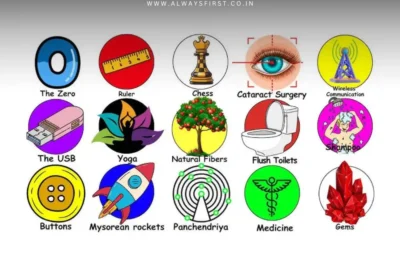Key Takeaways:
✔ India gave the world the numeral ‘Zero’, revolutionizing mathematics.
✔ Shampoo originated in ancient India, using natural herbs for hair care.
✔ Chess, buttons, and cataract surgery all trace their roots back to Indian innovators.
India’s Legacy of Innovation: Inventions That Changed the World
When we think of India, vibrant festivals, spicy cuisine, and ancient temples often come to mind. But beyond its cultural wealth, India has been a powerhouse of innovation for centuries—giving the world inventions so fundamental that we often take them for granted.
1. The Revolutionary Number: Zero
Imagine math without zero. Impossible, right? The concept of zero (shunya in Sanskrit) was first documented by Indian mathematician Brahmagupta in the 7th century. This breakthrough laid the foundation for modern mathematics, calculus, and even computer science.
2. Shampoo: Born in Ancient India
Long before commercial hair products, Indians were using a natural hair cleanser called “champu”—derived from herbs like reetha (soapberry) and shikakai. British colonialists adopted this practice, eventually leading to the modern shampoo we use today.
3. Chess: A Game of Strategy with Indian Roots
Originally known as “Chaturanga”, chess was developed in Gupta-era India around the 6th century. This strategic board game later spread to Persia and Europe, evolving into the chess we know now.
4. Buttons: Not Just a Fashion Statement
The world’s first buttons weren’t for style—they were functional ornaments used in Indus Valley Civilization (2000 BCE). These early buttons were made from seashells and used to fasten clothing.
5. Cataract Surgery: Pioneered by Sushruta
The father of surgery, Sushruta, performed cataract operations as early as 6th century BCE using a curved needle—a technique that laid the groundwork for modern ophthalmology.
6. Ayurveda: The Oldest Holistic Healing System
Long before modern medicine, India’s Ayurveda (5,000 years old) introduced natural remedies, yoga, and surgical practices that influence wellness trends globally.
7. Wireless Communication: Jagadish Chandra Bose’s Forgotten Contribution
While Marconi is credited with the radio, Jagadish Chandra Bose demonstrated wireless communication using radio waves in 1895—proving India’s role in early telecommunications.
Why Does This Matter Today?
From mathematics to medicine, India’s contributions are woven into the fabric of global progress. These inventions remind us that innovation isn’t confined to any one era or region—it’s a continuous human endeavor.
Next time you use shampoo, play chess, or even glance at your smartphone (which relies on zero’s binary code), remember—you might just owe a bit of gratitude to ancient Indian genius!








































Leave a Reply